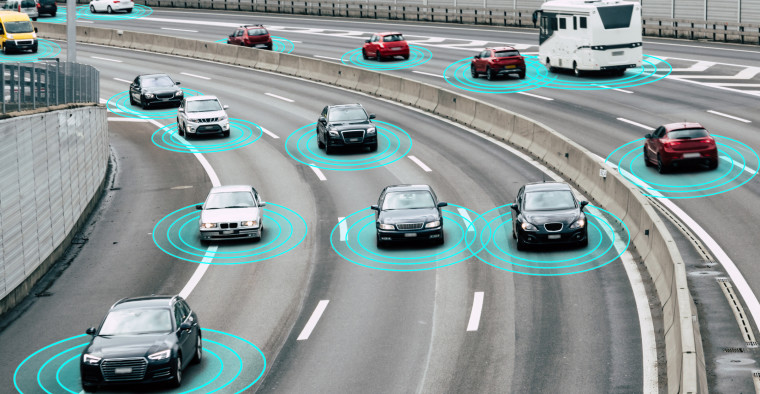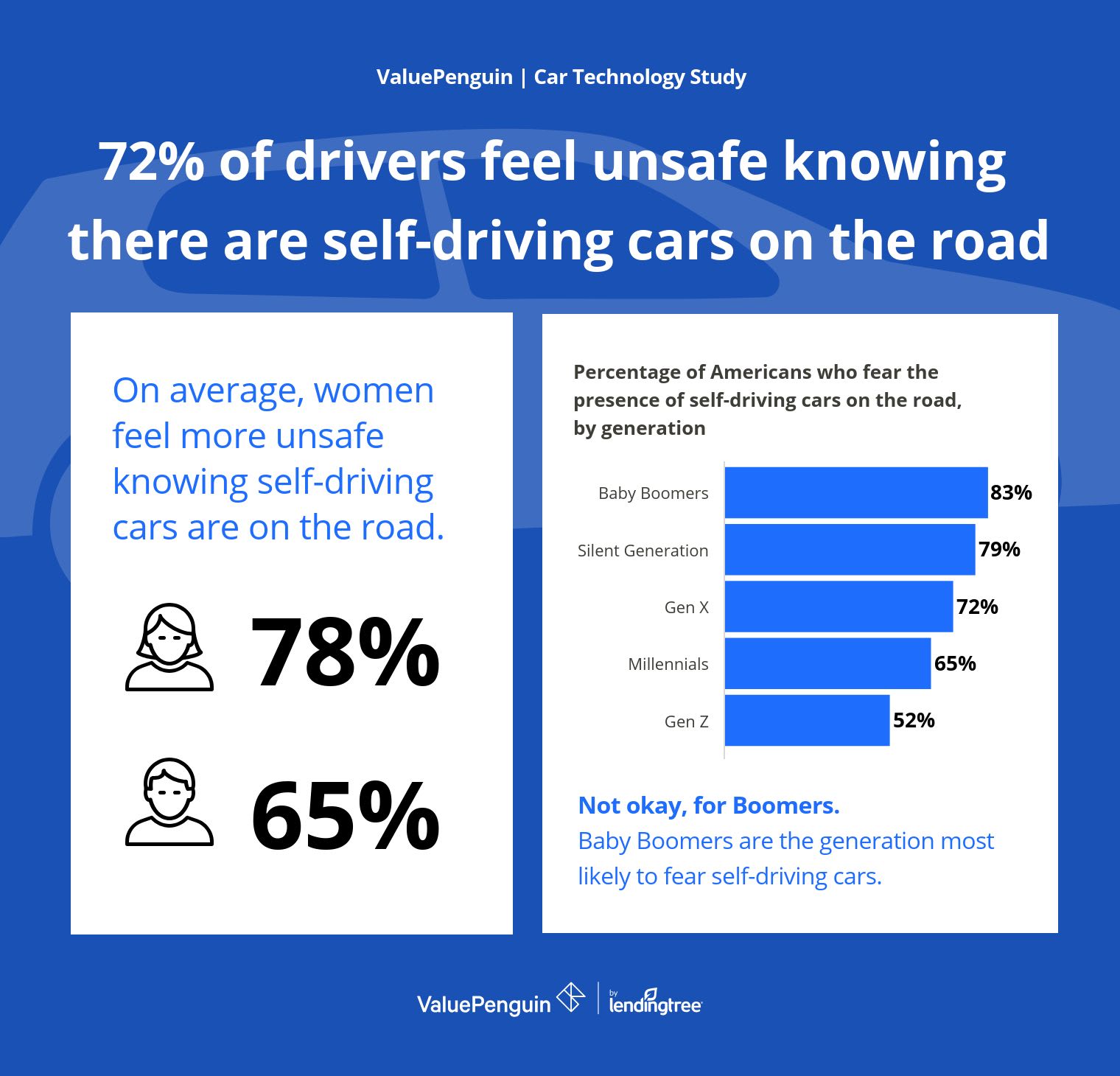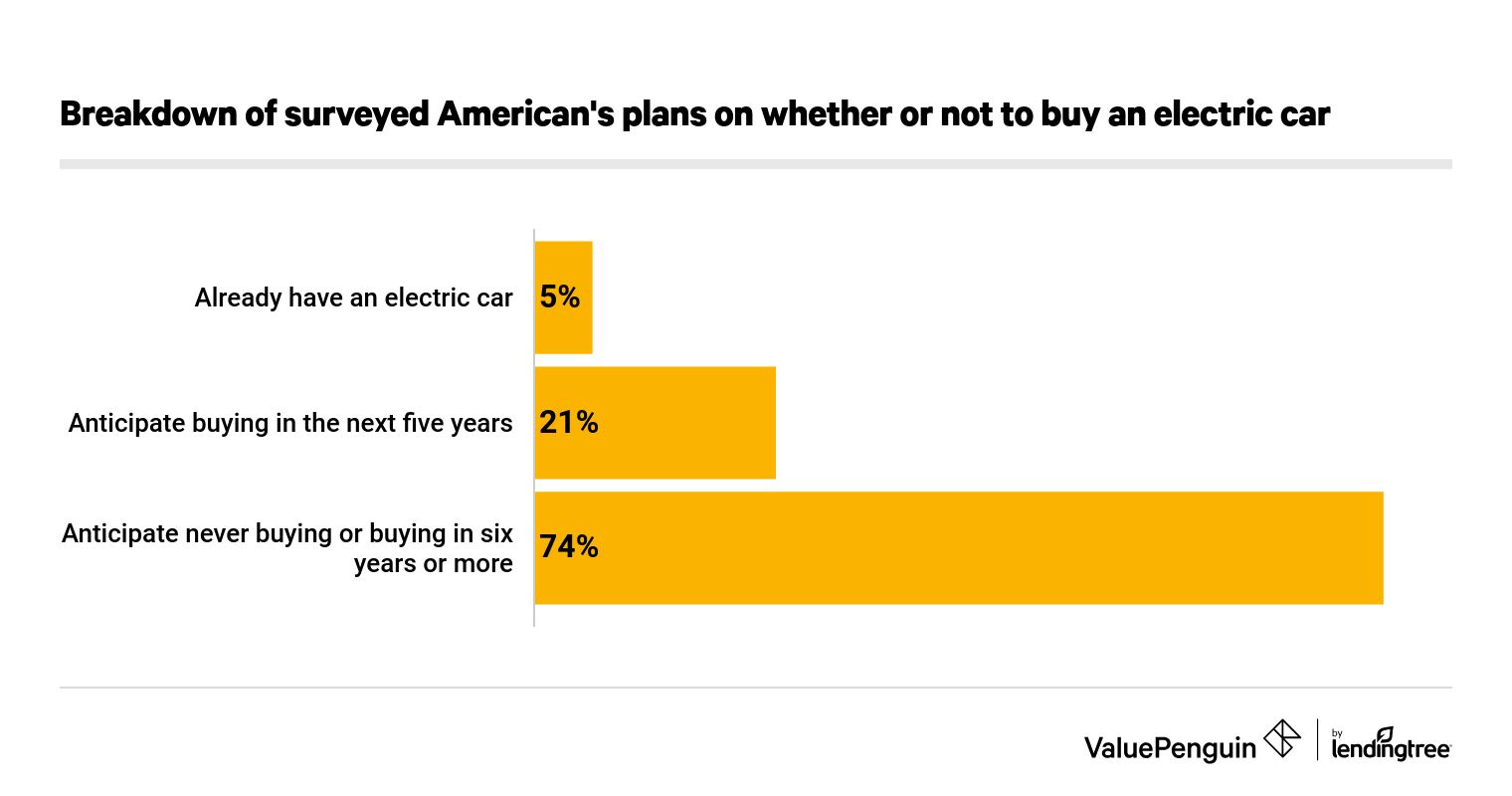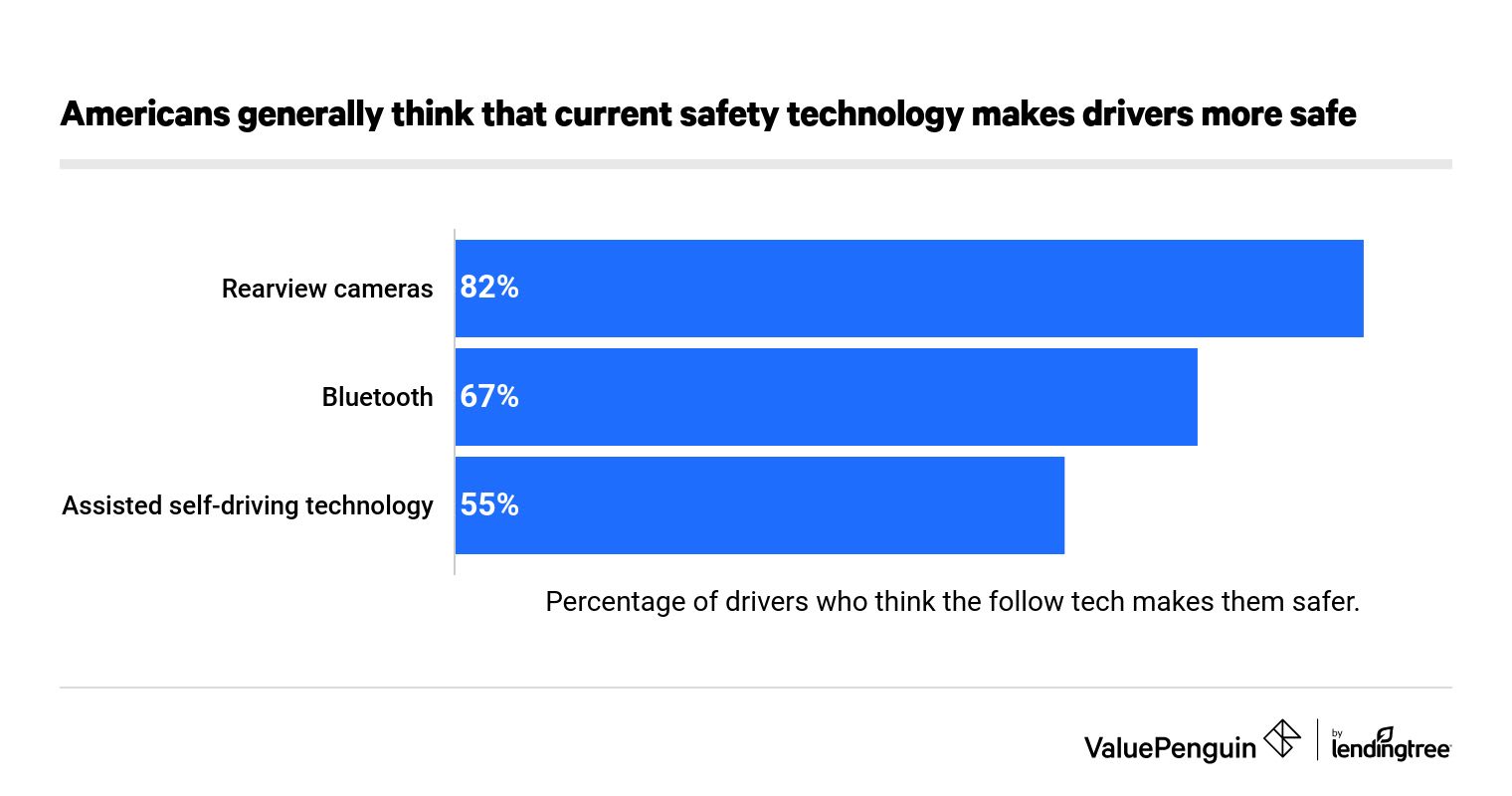Auto Insurance
Self-driving and Electric Cars Could be the Future of Travel. But Consumers Are Wary of the Technology

Six in 10 people are concerned with the amount of technology in cars now compared to five years ago, according to an online survey commissioned by ValuePenguin. But when it comes to a driver's appetite for technological advances, less is more.
Two types of technology are often heralded as the future of personal vehicle travel: self-driving cars (also called autonomous cars) and fully-electric cars. But people are afraid of the former, and, in the near term, unwilling to buy the latter, according to our survey. In fact, 72% of Americans would feel unsafe with self-driving cars on the road, and 74% don't anticipate buying an electric car in the near future.
Conversely, a majority of consumers think that more modest and incremental advances in driving technology — Bluetooth, backup cameras and assisted self-driving, for example — have improved the driving experience, and they're willing to spend extra to get it.
Current drivers — especially older drivers — fear the impact of self-driving vehicles on road safety
Sixty-four percent of consumers think that fully autonomous (meaning self-driving) cars will be on the road within 10 years. In fact, autonomous cars are already on the roads by the thousands, albeit with safety drivers — humans sitting behind the wheel — to take over in the event something goes wrong.
But the potential for something to go wrong is very much on drivers' minds. Seventy-two percent of those surveyed would feel unsafe with self-driving cars on the road.

Although a majority of all surveyed groups would feel unsafe with autonomous cars on the road, the difference between age groups can be stark. There was also a split between the sexes in their assessment of the safety of self-driving technology.
- The youngest age group surveyed, Generation Z, is much more comfortable with the idea of autonomous vehicles than others. Forty-eight percent would feel safe with this technology, a much higher comfort level than Millennials (35%), Generation X (28%), Baby Boomers (17%) or the Silent Generation (21%).
- Seventy-eight percent of women would feel unsafe with self-driving cars on the road, compared to 65% of men.
It's not just about future technology: drivers aren't sold on current electric vehicle technology either
Fully electric cars — distinct from hybrid vehicles as they only utilize battery-powered motors and do not use gasoline at all — may one day be universal, but in terms of consumer tastes, they don't represent the near future. In fact, the margin is overwhelming: 44% of Americans have no plans to ever purchase a fully electric car, and 30% only anticipate buying one six or more years from now.
That means 74% of Americans don't see an electric car purchase in their near-term future.

Similarly to self-driving vehicles, women and older consumers are more likely to harbor skepticism about current electric vehicle technology.
- Fifty-one percent of women never plan to purchase an electric car, versus only 38% of men.
- Thirty-seven percent of Generation Z and 35% of millennials currently own or anticipate buying an electric car in the next five years. This easily surpasses Generation X (29%), baby boomers (13%) and the Silent Generation (10%).
Despite not wanting to buy electric cars, a plurality of consumers think electric car owners should get a discount on auto insurance
Although many Americans don't plan to buy electric vehicles soon, they do think electric car owners should get a discount on insurance. Forty-three percent of Americans think electric cars should have cheaper car insurance than gas-powered vehicles, while 32% say they shouldn't and 25% are unsure.
Once again, the generational divide on car technology is stark. Fifty-four percent of millennials think electric car owners should get an auto insurance discount, while only 27% of baby boomers agree.
Electric cars are generally more expensive to insure than other vehicles due to higher repair costs. A Tesla Model 3, for example, costs an average of $3,817 per year to insure in California, versus $1,804 for a similar policy with a Honda Civic EX.
Drivers appreciate (and are willing to spend on) current vehicle safety technology
Consumers are wary of the coming autonomous and electric vehicle revolutions, but they have much more confidence in the potential for current smart-car technology to keep them safe. However, the type of technology they are comfortable with is incremental — and used in conjunction with their own driving skills — rather than revolutionary.
For example, take three groups of fairly common car safety technologies:
- Hands-free Bluetooth phone calls
- Rear-view cameras
- Assisted self-driving features (such as adaptive cruise control and lane-centered steering)
Consumers believe that all three types of technology make the driving experience safer. Perhaps, unsurprisingly, drivers believe that some of the more pervasive types of technology — Bluetooth and rear-view cameras — are most likely to increase safety.

Importantly, these technologies assist the driving experience while allowing the driver to still be in control. Answers to the survey reflect a need for drivers to trust their own abilities and traditional instruments.
- Forty-seven percent of Americans have a rear-view camera. But of those who have them, only 35% trust it completely and rely solely on it. Sixty-two percent say they only trust it somewhat and make use of their mirrors, too.
- Although 55% of drivers think assisted self-driving features like adaptive cruise control and lane-centered steering make them more safe, 45% think they result in no change in safety or a less safe experience.
Drivers are willing to pay extra for technology they believe increases their safety or convenience
A plurality of Americans are willing to spend more money on a car if it includes automated safety features, according to our survey.
Which statement best describes you? | % of Americans |
|---|---|
| I am more likely to pay more money for a car to come equipped with automated safety features | 43.3% |
| I am more likely to pay less money for a car with fewer bells and whistles | 31.0% |
| Not sure | 25.7% |
And drivers aren't just looking for technology that improves safety; they're also interested in current technology that increases their convenience. Forty-eight percent of Americans would spend extra for a car that would automatically parallel park for them. However, they're not going to break the bank: just under half of that group would only pay up to $500 for this feature.
Methodology
ValuePenguin commissioned Qualtrics to conduct an online survey of 1,120 Americans, with the sample base proportioned to represent the overall U.S. population. The survey was fielded from Dec. 20-23, 2019.
